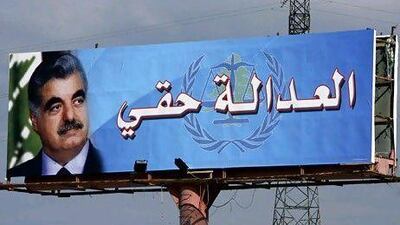Driving down a mountain last week trying to avoid the usual murderous driving of my fellow Lebanese, I caught the end of a programme on the BBC World Service about Estonia's economic miracle. It told how the tiny Baltic nation of 1.5 million broke free from the shackles of a Soviet command economy and raised its US$2,000 (Dh7,346) GDP per capita to $13,000 in the space of two decades. One of the ways it did this was by imposing a flat income tax of 26 per cent, regardless of income. "Fat chance of that working here," I mumbled to myself as another lorry thundered by, its driver blithely unaware that he nearly filleted the side of my car.
But as the reporter signed off, he said, and I paraphrase here: "Estonia could be an eventual model for the nations currently caught up in the Arab awakening and other developing countries."
Lebanon, with its relatively advanced democratic mechanisms: a vibrant private sector; a strong banking industry; a steady inflow of foreign capital; and a reputation for leisure and entertainment (I am aware that the cliches are slamming against the rocks even as I type) might be the ideal country to follow Estonia's example. Why, in Syria, we even have our own Russian bear on our doorstep. The parallels are too obvious to ignore, too juicy to dismiss.
But it's too late. We already blew it. After the 2005 Cedar Revolution, ignited in the wake of the killing of Rafik Hariri, the former prime minister, we might have made a decent fist of being a blueprint for economic success. If it was ever going to work, that was the time. Damascus, which had maintained a security presence for three decades, was out and a new civil society movement was pushing to help build a new Lebanon, one based on prosperity, democratic values, the rule of law and all the other cuddly ideals on which the West rests.
I had never taken to the streets for anything, anywhere, at any time in my life, but on March 14, 2005 we were convinced that we were on the verge of something special.
But it was all a mirage. As Michael Young wrote in his book Ghosts of Martyrs Square, the vast majority of the 1 million who showed up on that day were also there for other reasons. The Sunni street showed up because the Shia had their own demo on March 8; the Aounists were there to get their man back from 15 years of Parisian exile and the Lebanese Forces showed up to get Samir Geagea out of jail.
The relatively apolitical bourgeoisie, who were simply appalled at Hariri's brutal murder, could not carry a revolution by themselves. And over the next few years, either by the bomb, the bullet, war and a reverting to type, Lebanon's aspirations to be a modern state evaporated.
But still the illusion that Lebanon can be something special lingers. I had lunch with an American urban designer who had spent the past three months in Lebanon putting into practice the "City as Lab" concept.
She spoke passionately about the "determination" of the Lebanese and how the country, despite its obvious weaknesses, had left her feeling optimistic. New York, she said, had reached saturation; as an urban environment it was treading water.
Beirut, on the other hand, was a work in progress and this gave the city hope, a vibrancy through which something could be achieved. She spoke of the creative talent and how the Lebanese love affair with shopping was more than just retail therapy. It was an expression of self-affirmation. She spoke of the Lebanese youth. They were raw and ready to be fashioned into anything Lebanon's positive zeitgeist could make of them.
And yet Lebanon lives on a continual knife-edge. There have been flashes, not necessarily of Estonian resolve, but more of inherent short-term flair. When it is doing well, people can't get enough of Lebanon.
In recent years, buoyed by excessive liquidity from the increase in oil prices, Arab investors and Lebanese expats have been buying into Lebanon. But now that dark clouds are scudding across the region's skies, the investors are losing their appetite and the diaspora is reminded why it left in the first place.
There was another reminder last week, when the pre-trial judge for the Special Tribunal for Lebanon, the court investigating the Hariri killing, announced that there was enough evidence to try the four Hizbollah members for causing the blast that also killed 21 other people. The Lebanese authorities were instructed to arrest them and deliver them for trial.
The Estonians would have played it with a straight bat and sent in its SWAT team to do the business. Not in Lebanon, where the men are untouchable and where half the country thinks that Israel did it, not because there is evidence to support such a claim, but because it is our default setting, and this is why we will never have the discipline to be the Levantine Tiger. The ingredients are in place, but the vision and the courage to change the rules of the game and invite the country to work for prosperity is a pipe dream.
Michael Karam is a communication and publishing consultant based in Beirut

